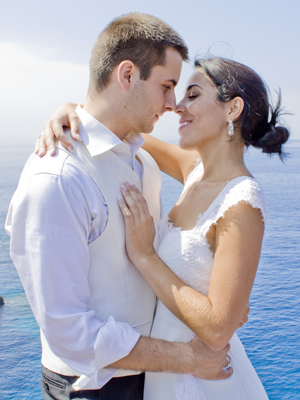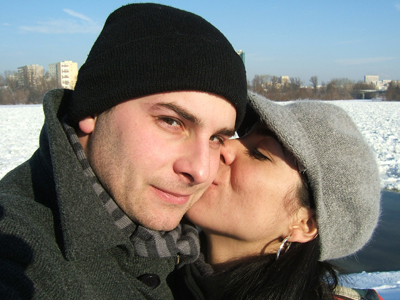The warm Canary Islands and freezing Poland might seem two worlds apart, but for Paula and Pawel, it was just perfection – or at least, they learned how to make it work.
Paula loves reading books and writing stories. Her favourite one took place in Portugal, leading her into a mathematic challenge: how to annihilate the more than 2800 km which separate Spain from Poland? Having studied Finance, Pawel was very into maths, and was therefore the right person to help her solve this challenge…

Paula and Pawel on their wedding day in Tenerife, Spain.
Paula was born in Tenerife, in the Canary Islands in Spain. In September 2006, her studies in History of Art sent her to Lisbon, Portugal, for Erasmus. Some students at her halls of residence soon organised a small party in order to get to know everyone who was living there; the halls were very international, hosting students from more than 20 different countries around the world. When Paula arrived, a Polish guy approached her and introduced himself. His name was Pawel, he came from Warsaw and he would be her future husband.
Back then, though, Paula just managed to smile, and say her name and nationality. No, this was not out of shyness. Paula barely spoke English. “I liked Pawel as soon as I saw him. But I thought it was impossible to get closer because I could not have a proper conversation with my poor level of English. I felt quite frustrated and even silly, but after some time I realised that words are not always necessary. A connection is something that either exists or not between two people, in a way no logic can explain. Besides, there is no better way to learn a language than having the need to speak. In these terms, Pawel became a great motivation for me to learn,” Paula says.
Nevertheless, it was not only the language barriers that confused Paula. Used to Spanish boys’ more expressive attitude, she could not clearly see the intentions behind Pawel’s more reserved approach.
“I guess Pawel was trying to make the first move, but it was hard to say, because Spanish guys are much more direct and Pawel was so discreet and careful that made me very confused. When he finally invited me to take a walk together around the district where we were both living in Lisbon, it was really stressful because we couldn’t communicate well and we were quite nervous. But then, of course, it couldn’t have been so bad, because we both wanted to repeat it,” Paula explains.
From the very first moments, Paula sensed that beyond his attractiveness and different appearance than most Spanish guys, Pawel was also very nice. Less than a metre away, Pawel was busy noticing Paula’s “exotic beauty,” but the more time he spent with her, the more he was captured by her personality. “By definition, the first impression of someone cannot be that deep, as the things you notice are mostly the superficial ones. So I was first attracted by Paula’s physical appearance. Then I discovered how good, modest and intelligent she was and that was what made me totally addicted to her,” Pawel explains.
“When you really want something with all your strength, kilometres get shorter.”
Like most Erasmus couples, Paula and Pawel didn’t expect their relationship to last after the end of the Erasmus experience. For two years, they lived separately, making the trip between Tenerife and Warsaw an ordinary part of their lives. Until Pawel decided to move to Tenerife. He lived there for three months, trying in vain to find a job with zero knowledge of Spanish. Finally, he got one, but back in Warsaw. So they got separated again with the future unclear and their common dreams still a blur. This was probably the hardest period in their relationship; months passed and they couldn’t see each other: “Distance was really hard at times but when you really want something with all your strength, kilometres get shorter. We were talking on Skype every day for hours. Sometimes we were connected while both studying and other times just getting bored together. We really got to know each other this way. We realised that we had become friends above all. We shared everything: thoughts, doubts, feelings, concerns… and this is how we started trusting each other and fell in love even more,” they explain.
The Decision
One evening, they were talking on Skype as usual and they made a decision. Paula booked a ticket to Warsaw… one way. She was heading to a country where winters were much colder than she could ever imagine. She didn’t know Polish at all, she had no friends, nor much chance of getting a job. Her friends and family thought she had lost her mind. However, in a tiny apartment in Warsaw, with no furniture and an inflatable mattress instead of a bed, they couldn’t be happier. “Sometimes life seems really hard but you have to keep swimming, because good luck can knock on your door any day. On a Thursday morning, you can leave the house for a job interview, then return home to find some crazy Polish guy waiting for you with an engagement ring,” Paula says.
In both cases, the answer was positive. Paula got a job as a Spanish teacher and accepted – of course – Pawel’s proposal. After some time in Poland, she made many good friends and even started to construct simple sentences in Polish. On 26 June 2010, they got married in Tenerife, organising all the details of their wedding from a distance as they were still living in Warsaw: “We were a bit afraid that something would go wrong, but on the day of our wedding, things couldn’t have been better. We were not nervous at all, because we were convinced that we were right for each other. It was an unforgettable day for both of us,” say Paula and Pawel, reminiscing about the day of their wedding.

On warm days or cold, the couple sticks together.
Five years after they first met at that party in a student residence, Paula and Pawel are now living in Madrid – they moved from Warsaw a year ago. Paula is working as a Spanish teacher for foreigners at an international school and Pawel as a financial controller at an IT company. In their free time, they share their common passions for cooking, photography and travelling. They love to walk in new places and get lost together, as well as arguing about their cultural differences and approach to everyday things.
“Pawel is very Polish. He loves to organise, plan and optimise every single detail. He is very perfectionist and he has a… great hobby: lists! He adores writing lists of everything: things to do, things to buy, etc… And if they are in Excel, he is in paradise! Personally, I hate anything connected to organisation. If you want to torture me, make me write a list,” Paula says.
On the other hand, Pawel sees Paula as a proof of certain Spanish stereotypes: “Paula always follows her heart and this is beautiful. However, there are moments where I really want her to simply silence her heart and be rational, make a plan about a trip or a list that she hates so much, but starts to love when we are lost in the supermarket not knowing what is missing in the shopping cart, or read a contract before signing it. But after all, I find it sweet (funny what love does to you!) and a “division of duties” allows us to get along well,” says Pawel.
“There are moments when I really want her to simply silence her heart and be rational.”
At least they both agree that when you have a relationship with someone from a different nationality, you have to be aware of the fact that different cultures also mean different approaches to life, and misunderstandings may occur. “However, this can happen also with couples of the same nationality, while they miss the exciting part of getting to know a different culture and sometimes a different approach to life,” they add.
As for the near future, they feel already lucky enough that they have managed to overcome these barriers and that they belong in the privileged category of young people who have a job, to make even greater plans: “We just want to enjoy what we have right now. We already know how it is to live abroad, so we are not afraid to do that again. We only hope that we won’t have to do it because of the hard circumstances in Spain, unless we want it.” They wouldn’t say no, though, to little Pawels and little Paulas in the next 5-10 years. Half Polish, half Spanish, their children will surely have interesting personalities. As long as they don’t fight all day long about… lists!
Cover photo by Oziel Gómez on Unsplash







